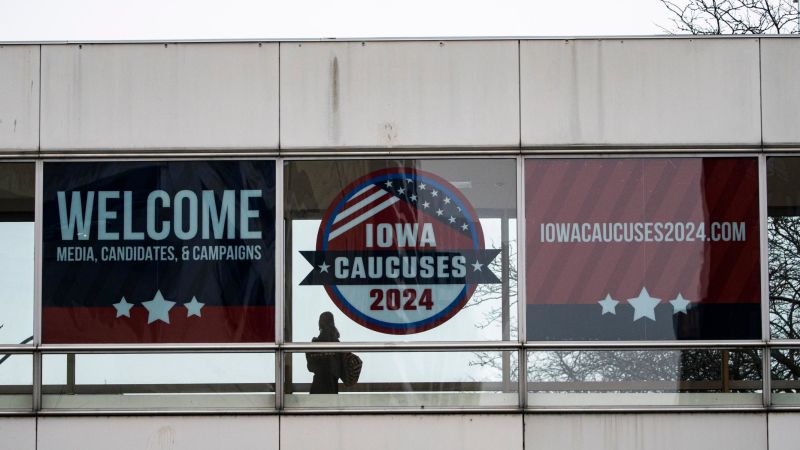Former President Donald Trump is undeniably the front-runner in Iowa’s Republican caucuses. While we have not had a single poll conducted and released publicly in January, the ones from December put Trump in the strongest position of any Republican at that point before the caucuses.
This might leave you asking why we should care about either Florida Gov. Ron DeSantis or former South Carolina Gov. Nikki Haley given they were both more than 30 points behind Trump in those same polls. The pair will face off in a CNN debate on Wednesday night, their final chance for a breakout performance ahead of next week’s contest. (Trump, for his part, declined again to debate his opponents and will instead do a Fox News town hall.)
The reason: Iowa results do a fairly lousy job of predicting what happens in the New Hampshire primary, but Iowa could help winnow the field as well as provide a momentum driven boost heading into New Hampshire.
Let’s start with what is obvious at this point: DeSantis is not doing well in New Hampshire. The latest CNN poll conducted by the University of New Hampshire has DeSantis down to fifth place with a mere 5% of the voter support.
It’s tough to imagine DeSantis having any real shot at the Republican presidential nomination if he came in third in Iowa and came in third or worse in New Hampshire. DeSantis’ campaign has to know that.
History is littered with southern conservatives who bet it all on Iowa and dropped out afterward. The one that comes most immediately to my mind is Phil Gramm. He, like DeSantis, was a fundraising machine and was seen as Bob Dole’s strongest rival for the 1996 GOP nomination. Gramm, though, finished poorly in Iowa and left the race.
If DeSantis finishes second in Iowa, he may stay in the race for a significant amount of time. The Florida governor could claim to be Trump’s strongest rival.
Haley, on the other hand, isn’t looking to merely keep her campaign afloat after Iowa. She’s looking to use it as a launching pad to the Granite State. She’s down just 7 points to Trump in our latest New Hampshire poll. The former South Carolina governor has risen from 20% in November to 32% now, while Trump is now at 39%.
While Haley has a minimal chance of winning in Iowa, that doesn’t matter as much as you might think.
Think about the two largest wins for non-incumbents in the history of Iowa’s Republican caucuses: Bob Dole in 1988 and George W. Bush in 2000. Neither of those people won New Hampshire. In fact, no Republican has ever won Iowa and New Hampshire.
Part of the reason both Dole and Bush lost in New Hampshire was their wins in Iowa weren’t surprising. Both held large leads a week out from the caucuses, and both slightly undershot their average poll.
This mattered because both also trailed in New Hampshire at this point. What history tells us is that the best way to quantify momentum coming out of Iowa is how much better candidates do than expected (i.e. how much better they do than their polling).
New Hampshire isn’t necessarily going to turn and validate Iowa’s choice if Trump wins a majority of the vote and defeats his competition by 30 points there. If anything, history suggests they’ll punish him electorally if he doesn’t match what are now sky high polling expectations.
Now, Haley doesn’t lead in New Hampshire at this point like the eventual winners did in 1988 (George H.W. Bush) or 2000 (John McCain). That actually puts a greater emphasis for Haley to outperform her polling in Iowa.
What she needs to occur is what happened to Democrat Gary Hart in 1984. Hart finished about 30 points behind the frontrunner Walter Mondale in the Hawkeye State – similar to what polls currently indicate for Haley. Hart also did better than the polls said he would.
Hart was able to use that finish to catapult from a distant second in the New Hampshire polls to a strong first place in the final result. He then closed in on Mondale in national polls, though he ultimately came up short for the nomination.
In the 2024 campaign, Haley has room to grow in the first primary state. Chris Christie got 12% support in New Hampshire, and most of his backers (65%) selected Haley as their second choice.
It doesn’t take much imagination seeing these folks move to Haley’s column if she has momentum coming out of Iowa. And a win in New Hampshire would establish Haley as Trump’s chief rival a month ahead of the South Carolina primary – her home state.
Of course, this is all hypothetical right now. Haley could disappoint in Iowa and not have any momentum heading into New Hampshire. If Haley can’t win in New Hampshire, it might be fair to ask where she can win. She does best among moderate Republicans, who are a far larger share of the New Hampshire electorate than they are nationally or in Iowa.
The bottom line: There’s a lot on the line in Iowa, even if you think Trump’s very likely to cruise there.
Read the full article here





